Latest News
Making a Difference through Parkinson’s Education, Advocacy and Clinical Trials
Posted by on March 30, 2015 at 10:56 AM EST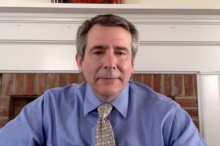
Steven DeWitte is being honored as a Champion of Change in the Fight Against Parkinson's Disease.
It was March 5, 2005, I heard the chilling words, “I’m relatively certain you have Parkinson’s disease.” I was totally ignorant of the implications, and if not for the solemn delivery, I would not have viewed this news as serious. I slowly began my self-education, initially through Google and chat rooms.
Serious education began at the inaugural World Parkinson’s Congress, which revealed how the disease progresses over time, and exposed me to great people who deserved a better quality of life. I was inspired by fellow People with Parkinson’s (PWP) such as Robledo and Issacs. They showed me that patient advocates could have a broad reach and encouraged my drive for positive change.
I started my first support group in October 2006 with eight attendees. The group’s reputation grew, leading to the founding of the Connecticut Advocates for Parkinson's Inc. With names like Hespelers, Baldwins, Pelchat, and Johnson, it has evolved into a collaboration of three State Advocacy Groups named the Make a Difference Parkinson’s Alliance (MADPA), which serves over 300 PWP.
With this foundation, we began to understand and seek opportunities to make a difference, through education, advocacy, and participation in clinical trials:
Education: Patients need to understand the progressive nature of the disease and stay current with treatment options. Sharing their knowledge with others helps the Parkinson community to assess treatments effectiveness and it encourages others to “make a difference.”
Advocacy: There is no stronger influence for change, than sharing patient experiences with elected officials who can drive change through research funding and the appropriate support for regulatory authorities.
Participating in Clinical Trials: It takes over fifteen years and at least $1 billion to bring a symptom-relieving drug to market. Clinical trials are a vital step in this process and require a sufficient number of patients in to the various stages of the clinical trials. Accelerating the recruitment and enrollment of volunteers can have a direct impact on the time and cost to develop advance treatments for Parkinson’s disease.
I discovered two major obstacles to participation in clinical trials was access and fear. PWP were more willing to participate in Clinical Trials than the statistics represented, so I built a database of patients who would participate in trials if transportation were provided. Registrants increased, when they knew others would accompany them, thus eliminating some of the fears. From this, the Clinical Trial Transportation Program (CTTP) was created.
The Program demonstrated its effectiveness in several ways:
- The Program provides a list of pre-screened volunteers that dramatically reduces overall recruitment time.
- Trial results were accelerated, thus speeding data that can be used toward treatment-based research.
- The trial pool attributable to the CTTP lived over 100 miles from the Research Center. Volunteers through the CTTP are a new demographic for most studies.
- By reducing the time it takes to gather the data, there can be cost savings.
Since the program’s first trip to Boston with seven people on July 15, 2011, it has now logged over 100 patient visits at such institutions as Columbia Medical Center, Beth Israel Deaconess, and Weill Cornell.
This journey has brought me many good friends, which has increased my urgency to beat this disease. Through it, we have learned that patients of any disease can be empowered to make a difference, and are important partners in the development of disease modifying treatments.
I am truly humbled to be recognized as a White House Champion for Change, but share this honor with the many before me, and those currently, who are “making a difference” towards finding a cure for Parkinson’s.
Steven DeWitte is the founder and co-chairman for the Connecticut Advocates for Parkinson’s (CAP) and its affiliate organization, the Make A Difference Parkinson’s Alliance (MADPA)
Learn more aboutUsing Technology to Give People with Parkinson’s Specialized Care
Posted by on March 30, 2015 at 10:51 AM EST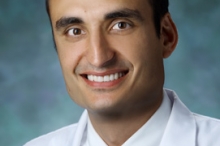
Dr. Ray Dorsey is being honored as a Champion of Change in the Fight Against Parkinson's Disease.
The burden of Parkinson’s disease is increasing rapidly both domestically and globally. Over the next generation, the number of people with Parkinson’s disease will almost double. However, many individuals with Parkinson’s disease lack access to care due to distance and disability. In the U.S., over 40 percent of Medicare beneficiaries with Parkinson’s disease do not see a neurologist and those that do not are 20 percent more likely to fracture a hip, 20 percent more likely to be placed into a skilled nursing facility, and 20 percent more likely to die. To increase access to care, we are using simple video calls to connect Parkinson’s specialists directly to patients in their homes. These virtual house calls offer patients the care they need, the convenience they want, and the comfort they deserve.
With generous support from the National Parkinson Foundation, Patient-Centered Outcomes Research Institute, Parkinson’s Action Network, and our technology partners, we are conducting the first national random controlled trial of telemedicine for Parkinson’s disease. In addition, with generous support from Davis Phinney and his foundation, and Drs. Michael Okun, Carlie Tanner, and Kevin Biglan, we have developed Race-PD which offers 250 individuals across the country the opportunity to connect with Parkinson’s disease specialists for free. We hope that these efforts will help remove barriers for this care model, including arcane licensing requirements and absent Medicare reimbursement. Our vision is to enable anyone anywhere with Parkinson’s disease to receive care.
We also want to enable anyone anywhere with Parkinson’s disease to participate in research. With unprecedented support from Apple, creative geniuses like the mathematician Dr. Max Little, and outstanding partners such as Sage Bionetworks and The Michael J. Fox Foundation, mPower was released on March 9, 2015. A smartphone application designed specifically for Parkinson’s disease research, mPower allows individuals with Parkinson’s disease to track their symptoms in real time, share this information with researchers, and receive immediate feedback for themselves. While not perfect, mPower provides a platform for greater future efforts, including the hope to connect more people to care.
Dr. Ray Dorsey is the David M. Levy Professor of Neurology and Director of CHET at the University of Rochester. Dr. Dorsey is helping investigate new treatments for movement disorders and improve the way care is delivered for individuals with Parkinson’s disease and other neurological disorders.
Learn more aboutHow to Make a Difference in Parkinson’s Disease Patients’ Lives Today and Every Day
Posted by on March 30, 2015 at 10:48 AM EST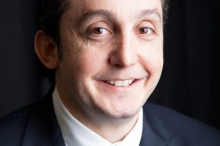
Michael S. Okun, M.D. is being honored as a Champion of Change in the Fight Against Parkinson's Disease.
I am humbled but also honored to be named a White House Champion of Change, and I hope that this opportunity will help to bring awareness and to galvanize our country to come to the assistance of the over 1 million Americans with Parkinson’s disease. The recent forecasting estimates are staggering. If accurate, the numbers suggest an urgent need to wake up and to recognize that we are on the cusp of an emerging pandemic. It is frightening to consider that in the world’s most populous nations, the number of people with Parkinson’s will double to almost 30 million by the year 2030. These escalating statistics may seem unbelievable, but they are real, and they are growing. Age is the unavoidable and undeniable risk factor underpinning the development of Parkinson’s disease. As life expectancy increases, so too do the number afflicted.
Most of my colleagues in academia may identify me with the development of neural network approaches designed to facilitate a deeper understanding of the brain and to develop new therapies in Parkinson’s disease and deep brain stimulation (DBS). They may have read one of hundreds of boring articles or book chapters I have penned over the course of many years. As a physician caring for Parkinson’s disease patients, I do not however, consider this my primary identity and purpose. I believe my calling is to alleviate human suffering, and to add meaning to the lives of those suffering from Parkinson’s disease and movement disorders.
In travelling the world as the National Medical Director for the National Parkinson Foundation (NPF), I have met tens of thousands of Parkinson’s disease patients, family members, and friends. One of the most common questions on their minds is “what can I do to make my life and the lives of those around me better?” In 2002, we dreamed of building a model Center for Parkinson’s disease care, education and research. In 2011, former Attorney General Janet Reno was our first patient at the new UF Health Center for Movement Disorders and Neurorestoration. Our philosophy was and still is very simple, “the patient is the sun (not the doctor), and we should all orbit around the patient.” We created an integrated model to facilitate true patient-centered care and also to provide access to, and to promote Parkinson’s research. The model is exportable, and we have a regular influx of international visitors to Gainesville, FL. These visitors seek to learn the secrets required to create a value based interdisciplinary care facility for Parkinson’s disease patients and families. Additionally, I have had the privilege to help develop and administrate over 40 international NPF Parkinson’s Centers of Excellence. These NPF Centers set the “care standard” and they continue to drive the quality and innovation needed for the future of Parkinson’s disease care and research.
Access to specialist care has been an urgent need in the US and abroad. Since 2006, I have had the honor of hosting the online international “Ask the Doctor Forum,” on the NPF website. To date I have answered over 20,000 questions from patients, families and physicians. Reaching the Parkinson’s community with education and arming them with facts and data has been a daunting challenge, especially since most of the information is available only in English. To overcome this critical need, my colleagues and former trainees graciously helped me to translate my book, Parkinson's Treatment: 10 Secrets to a Happier Life into over 20 languages.
Listening to thousands of Parkinson’s disease sufferers, I am deeply inspired. Their rich history and experiences provide all the motivation necessary to press on toward better care and better treatments. The four simple words “you have Parkinson’s disease” will pierce the heart and drain the dreams of 50,000 people worldwide each year, but we can make a difference in their lives today and every day.
Michael S. Okun, M.D. is currently a professor of neurology and co-director of the University of Florida Health Center for Movement Disorders and Neurorestoration. He is also the national medical director for the National Parkinson Foundation.
Learn more aboutThe Patients’ Voice at the Table
Posted by on March 30, 2015 at 10:41 AM EST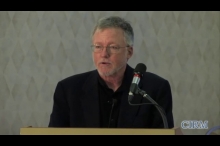
Greg Wasson is being honored as a Champion of Change in the Fight Against Parkinson's Disease.
Twenty years ago, when I was diagnosed, Parkinson’s was a movement disorder, period. The trope was “Alzheimer’s disease takes your mind but leaves your body intact; Parkinson’s takes your body but leaves your mind intact.” It was neat, easy to remember, and wrong.
Essentially no patients participated in decisions that shaped the funding, research, clinical protocols, and other factors that went into finding better treatments for PD. Patients were the passive recipients of experimental treatments, their reactions assessed to determine whether the treatment met statistical endpoints for improved motor control. Patients were talking monkeys, with their advantages and disadvantages: disadvantages - they liked to talk, couldn’t be kept in cages, and couldn’t be intentionally sacrificed for data retrieval; advantages - they were plentiful and cheaper than monkeys, didn’t require cages and food, and they were the target population, making data assessment more direct.
Much of the credit for the current view of PD as a multi-faceted disease, including cognitive and sensory components, belongs to those talking monkeys who refused to stop talking, and the researchers who realized that to dismiss evidence that did not fit the prevailing clinical paradigm was unsound science. The story of the progress in understanding PD is due in part to the strategic partnerships developed between the scientific and patient communities.
My involvement in what became the Parkinson’s patient advocate movement began as a member of an online bulletin board for PD patients in the late 1990s. There, patients compared notes and found shared symptoms that could not be explained under traditional PD models. The monkeys had begun to think outside the cage, rattling the bars and demanding to be heard.
During this time I also started volunteering with the Parkinson’s Action Network (PAN), which is devoted to advocating for the Parkinson’s community in the federal government. When my involvement in organizing an online petition to the White House on stem cells was noticed, PAN asked me to submit a proposal for a grassroots network advocacy program. The proposal was accepted, and my wife Ann (who also has Parkinson’s) and I were given a grant to travel across the country to recruit patients and their loved ones for the program. We traveled constantly for two years to promote the program, finding hundreds and eventually thousands of ordinary folks willing to play a part in making the voice of the patient heard in Congress.
The contacts Ann and I made during the Grassroots Network recruiting campaign led to our participation in other significant efforts. We testified before the California Legislature to enact the first laws to legalize research utilizing embryonic stem cells. We also helped pass Proposition 71 allocating $3 billion for stem cell research in California.
As other opportunities came along to give a patient perspective, Ann and I rarely said no. We joined up with other grassroots patient advocates to be heard on issues that patients were considered too “naïve” to know had already been settled by science. Cognitive loss, depression, pre-symptomatic olfactory loss, gastrointestinal issues, were raised again and again, and now sympathetic scientists were listening and confirming these concerns with new research.
Today, patient advisory councils, patients on IRB’s, and grassroots patient members of the boards of directors of national Parkinson’s organizations are accepted as routine and necessary. Most patients cannot engage in arcane issues of PD biochemistry. But we are smart people, and we can tell scientists things that they otherwise might never know - like when they stopped being able to smell the roses in their gardens.
Greg Wasson has been an active member of the Parkinson’s community for over 15 years, largely as an advocate with the Parkinson's Action Network (PAN)
Learn more aboutEveryone Can Play a Part in the Search for a Cure
Posted by on March 30, 2015 at 10:38 AM EST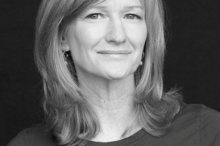
Deborah W. Brooks is being honored as a Champion of Change in the Fight Against Parkinson's Disease.
When I co-founded The Michael J. Fox Foundation for Parkinson's Research (MJFF) with Michael in 2000, we had one goal: accelerate new treatments and, ultimately, a cure for Parkinson’s disease (PD). We put patients front and center and reached across academia, industries and government. We brought together researchers, technology and clinical study volunteers. And today, there’s an unprecedented level of patient engagement with research efforts, the drug development pipeline is the most robust ever and a cure is that much closer.
More than 1 million people in the United States have Parkinson’s, the second most common brain disease after Alzheimer’s. In 2015, around 60,000 more Americans will be diagnosed with PD, and this number will only increase as the global population ages. Our urgency is shared with these patients and families. We’re honored to include fellow Champion Steven DeWitte in our Patient Council. Their role as advisors on patient priorities and outreach to increase clinical trial participation is invaluable.
We believe that a patient-centric vision and opportunities to take strategic risks are key to progress in finding a cure. So MJFF-funded scientists are studying targets such as the protein alpha-synuclein, which clumps in the brain cells of people with Parkinson’s and has a genetic link to PD. In addition to examining its role in Parkinson’s genesis, alpha-synuclein is the focus of two vaccine approaches in disease-modifying clinical trials.
We’re also investigating mutations in the LRRK2 gene, the greatest known genetic contributor to PD, to advance research in disease onset and progression. Last year our landmark biomarker study, the Parkinson's Progression Markers Initiative, began enrolling people with either a LRRK2 or alpha-synucein genetic mutation.
MJFF is also making strides in meeting the needs of those living with Parkinson’s day to day. Available drug therapies don’t treat all symptoms and can wear off before it’s time to take the next dose. So we invest in research that we believe has the greatest potential to help patients maintain their functionality and comfort longer. In the last 18 months alone, more than a dozen projects with MJFF early-stage investment have garnered promising results leading to additional funding; a number are in clinical testing. The U.S. Food and Drug Administration approved three new drugs for Parkinson’s symptoms in 2014; significant for any medical indication.
Those taking part in research allow these milestones to happen, and MJFF is steadfast in supporting them with up-to-date engagement platforms. We’re working with tech leaders like Intel and Apple to leverage devices that conveniently collect and measure data. We’ve launched Fox Insight, a data-collection study that also serves as a hub to link personal and device data from other studies, from both those with and without PD. Our web-based Fox Trial Finder tool matches people with the clinical trials that need them, both in person and online. The rewards will ripple beyond these individuals to the entire PD community and to our nation.
I am constantly inspired by the commitment the tens of thousands of patients and their families who fund our high-risk, high-impact work, and who participate in clinical research. Only through studying people with and without PD will we find a cure. I am often reminded of Michael’s decision to take action, knowing each person who follows his lead contributes to a cure. While I’m honored to be named a White House Champion of Change, I believe they are the true heroes of this work.
I hope you, too, are inspired to learn more about getting involved. Only together will we reach the day when no one will have to live with Parkinson’s disease.
Deborah W. Brooks is co-founder and executive vice chairman of The Michael J. Fox Foundation for Parkinson's Research (MJFF). MJFF is dedicated to finding a cure for Parkinson's disease through an aggressively funded research agenda and to ensuring the development of improved therapies for those living with Parkinson's today.
Learn more aboutBe informed. Be active. Be engaged.
Posted by on March 30, 2015 at 10:35 AM EST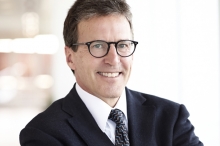
Davis Phinney is being honored as a Champion of Change in the Fight Against Parkinson's Disease.
I carried the Olympic torch as part of the torch relay when it came through Boulder en route to the Olympic Games in Salt Lake City in 2002. That feeling, that responsibility, that obligation of bearing the torch – an inspiring symbol of light and hope – has stayed with me, and it informs everything that we do at the Davis Phinney Foundation.
The Davis Phinney Foundation’s programs do more than educate; they motivate. Motivation is important to people with Parkinson’s, because it’s easy to let apathy set in and to wait to feel better. We’re saying, ‘don’t wait – take that first step, it’s empowering.’ We’re out to change what it means to live with Parkinson’s. Our message is this: be informed. Be active. Be engaged. Get out there and take control of your destiny. Participate actively in your own care. If, through the Foundation, we can convince everyone living with this disease to do one thing today, make one small change that’s going to have a positive impact on quality of life, then we’ve succeeded.
2015 marks the second decade of the Davis Phinney Foundation, and we’re still committed to our original vision: to help people with Parkinson’s live well today. I’m excited to see the Foundation expanding its reach, providing much-needed information to a wider audience, whether they’re tuning in to our webinars, coming to The Victory Summit® events or downloading our self-care manual, “Every Victory Counts,” or our terrific exercise video, “Parkinson’s Exercise Essentials.” Last year, we partnered with Move4Parkinson’s to bring our educational event to Ireland. This year, we’ll be taking it on the road to Malaysia. Wherever there are people who want to live better, today and for the long term, we’re finding ways to reach them with the support and tools they need to succeed.
Davis Phinney is the founder and board vice-chair of the Davis Phinney Foundation, a nonprofit dedicated to providing information, inspiration, tools and research to help people living with Parkinson’s disease to live well today.
Learn more aboutTo Make the Best Better: Advocacy & Community Service is Not a Choice, it's a Responsibility
Posted by on March 30, 2015 at 10:26 AM EST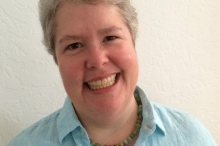
Angela Robb is being honored as a Champion of Change in the Fight Against Parkinson's Disease.
At the age of eight, I started my community service career. Hard to imagine that an eight-year-old would make such a choice. That is when I was introduced to 4-H by my mother who was a volunteer adult 4-H leader. The motto for 4-H is "To Make the Best Better.” For the next 10 years, I participated in all levels of community service through this youth organization. My passion for service was further enhanced by great leaders including local, state, and national adult 4-H volunteers and extension agents.
During college, I volunteered at Potomac State College and West Virginia University (WVU) as a member of Circle K and Alpha Phi Omega service fraternity at WVU. My passion for community service is part of the reason I pursued a degree in political science with an emphasis on public policy and administration from West Virginia University.
My most important role as an advocate and volunteer has been in service to the Parkinson's disease community for the last 19 years. When Parkinson’s disease (PD) entered my life, unlike most people, it was not a shock. I've never known my husband, Karl, without young onset Parkinson's disease. He was diagnosed five years before I met him, at the age of 23. We have been married for 19 years. I love my husband, but I do not love Parkinson's. We acknowledge PD is part of our life, but not the entirety of our life. I'm a carepartner. My husband and I decided, in the beginning of our relationship, that we are partners in this journey living with Parkinson's.
Advocacy and community service is something I do every day. Whether I am posting PD resources online, emailing articles to support group members, speaking with caregivers over the phone, handing out materials promoting advocacy through the Parkinson's Action Network (PAN) at a an event, or helping a friend in need - I consider these actions as my way to make things better for my community. Helping and serving are a part of my daily life.
When I am asked to speak to the community, I'm adamant about the importance of each caregiver/carepartner sharing and communicating their own personal story. Each caregiver has a unique circumstance we all need to be aware of. Not only does this help those of us in the community understand their needs but it also empowers the caregiver to know they are not alone. Being heard is vitally important. Many times caregivers feel isolated and that no one knows what they are going through.
When I participate as a PAN advocate and share my personal story, I'm always quick to add that I'm also representing all those caregivers who are not with me today or have not had an opportunity to share their story. I cannot relay all the stories, but I truly feel that when I am speaking to legislators, medical professionals and scientists, they need to know there are so many unheard voices in the community.
It is my goal to continue my volunteer work for the Parkinson's community. To make the best better for all the people I meet. To honor my husband and all those living with chronic illnesses. I'm deeply humbled and honored to be selected as a Champion of Change.
Angela Robb is a Parkinson's disease carepartner and advocate living in Fairfax, Virginia. Professionally, she is president of TrueTip LLC and creative director for RobbWorks LLC.
Learn more aboutLGBT Health Awareness Week: The Affordable Care Act Is Working for You
Posted by on March 26, 2015 at 1:33 PM ESTEd. note: This is cross-posted on the U.S. Department of Health and Human Services' blog. See the original post here.
Every day here at HHS, we work hard to ensure that all Americans have the building blocks to lead healthy and productive lives. That is especially important for groups that have unique health needs or have traditionally been underserved, like the lesbian, gay, bisexual, and transgender (LGBT) community. This week is LGBT Health Awareness Week, and I wanted to take the opportunity to highlight the progress we’ve made in our work to ensure LGBT Americans have the same rights and protections as other Americans.
Over the last few months, we’ve been focused on getting people signed up through the Health Insurance Marketplace. After another successful Open Enrollment period, millions have gained access to health care coverage – some for the very first time. While there is more to be done, the evidence is clear – the Affordable Care Act is working and delivering access, affordability and quality. Since several of the Affordable Care Act’s coverage provisions began to take effect in 2010, about 16.4 million uninsured people have received coverage. That’s the largest reduction of the uninsured in four decades.
So what does all this mean for those in the LGBT community?
We know that, on average, LGBT Americans suffer from higher rates of cancer, obesity, tobacco use, HIV/AIDS and mental illness than the rest of the nation. Five years after the Affordable Care Act was signed into law, we know we’ve made real progress.
Learn more about
- &lsaquo previous
- …
- 6
- 7
- 8
- 9
- 10
- 11
- 12
- 13
- 14
- …
- next &rsaquo


Twitter